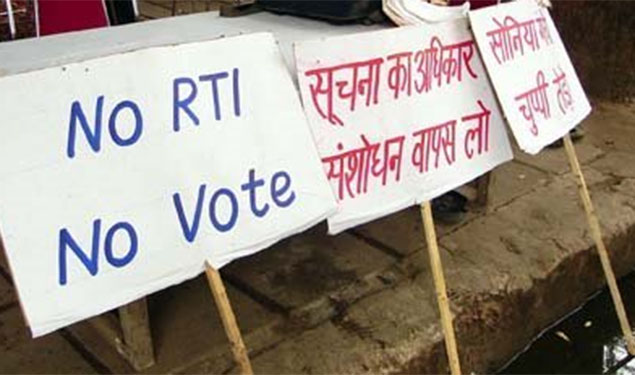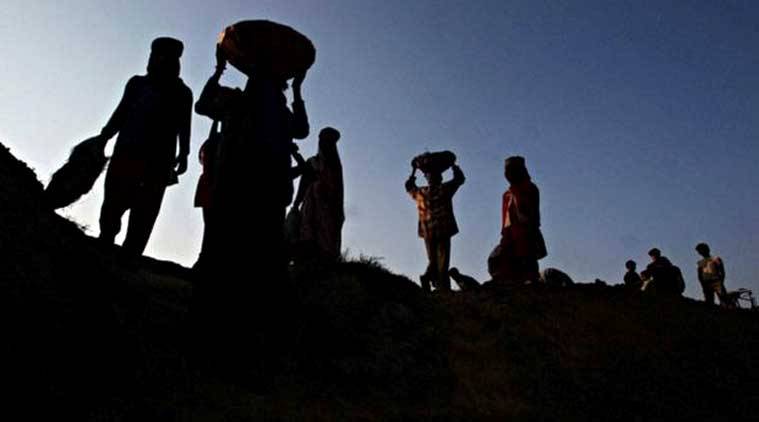
The NDA government on July 19, 2019 introduced the RTI Amendment Bill in Lok Sabha. The proposed amendments violate basic federal principles of the Constitution. The suggested amendments are regressive and undermine the independence of Information Commissions, thereby diluting the framework for transparency within which the act was conceived. When the RTI was passed in 2015, it created a statutory body- Information Commission which was structurally independent and autonomous.
It had the final authority to adjudicate claims of access to information by citizens from government.
The tenure, salary, and the terms of service of the Chief Information Commissioner were equivalent to that of the Chief Election Commissioner.
However, the amendments recently suggested in the parliament tries to bring the Information Commissioners under control of Central Government by diluting their tenure, salary, and terms of service to be decided by the Central Government.
A number of former information commissioners came forward on Wednesday to criticize the attempts by the Narendra Modi government to rush the RTI Amendment Bill, 2019, through the parliament without following a proper consultation process. If passed, they cautioned that the amendment would weaken the transparency law which is rated the second-best in the world – by diminishing the stature of the information commissioners who perform the important role of directing the bureaucracy to reveal the information sought by citizens.
On the 25th July, when the Rajya Sabha passed the RTI Amendment Bill, 2019 despite strong opposition from RTI activists who call it an attack on the transparency movement by the Narendra Modi government it came as a blow to the opposition, which was hoping to send the seven Bills passed in the Lok Sabha during this session to legislative scrutiny.
The RTI Bill has been a matter of controversy, with many RTI activists saying that the amendments will dilute provisions of the original law and lend the government both direct and indirect advantages to withhold information of public interest.
Sonia Gandhi had said that the amendments will subvert the historic RTI Act, which was “prepared after wide-spread consultations and passed unanimously by parliament”.
Congress leader Jairam Ramesh said the Bill is “designed to kill RTI”. He said PM Modi was taking “revenge” on the Act as RTI applications had revealed “embarrassing” details about his education qualifications, and on key claims made by his government, such as returning black money stashed abroad and weeding out bogus ration cards.
Opposition parties, which have termed the amendment the “RTI Elimination Bill”, argue that authorising the government to take a call on the employment and pay of RTI authorities will take away their independence.
The opposition and the previous Information Commissioners have argued that even honest officials will stop disclosing sensitive information if their job and salaries are at stake.
The Right to Information Act passed in 2005 is used every year by nearly 6 million citizens of the country. It enables ordinary citizens to access information relating to government work, which officials might otherwise hide. The information commissioners are the final authority on whether governments must disclose information that had been sought by RTI applicants. The law provided them a fixed term of five years and salaries equivalent to their counterparts in the Election Commission of India.
The independence of the information commissioners is critical for the effective functioning of the law. Only an independent commissioner will be able to take decisions against the government in the public interest.
Former CIC Sridhar Acharyulu, who during his tenure gave some landmark rulings including on transparency around demonetization and Modi’s degree, charged that “Not only the RTI, but freedom of speech and expression is also under threat.”
He said while the CIC is upholding the right to information, which is a constitutional right, the government wants to curtail its powers. “I want every citizen to oppose this Bill, it has to be abolished. It attacks the best legislation in the world, which is the RTI Act, and if it is passed, then the institution would be destroyed.”
While the government amidst all the oppositions is claiming that the amendment will strengthen the act, what will actually help the RTI implementation is the insurance of having time bound and transparent appointments to fill vacancies of commissioners and addressing poor implementation of Section 4 of the RTI act on mandatory pro-active disclosure. Without taking steps for this implementation, and addressing the complete lack of transparency in electoral funding, the government is weakening the democracy by undermining the statutory bodies.









